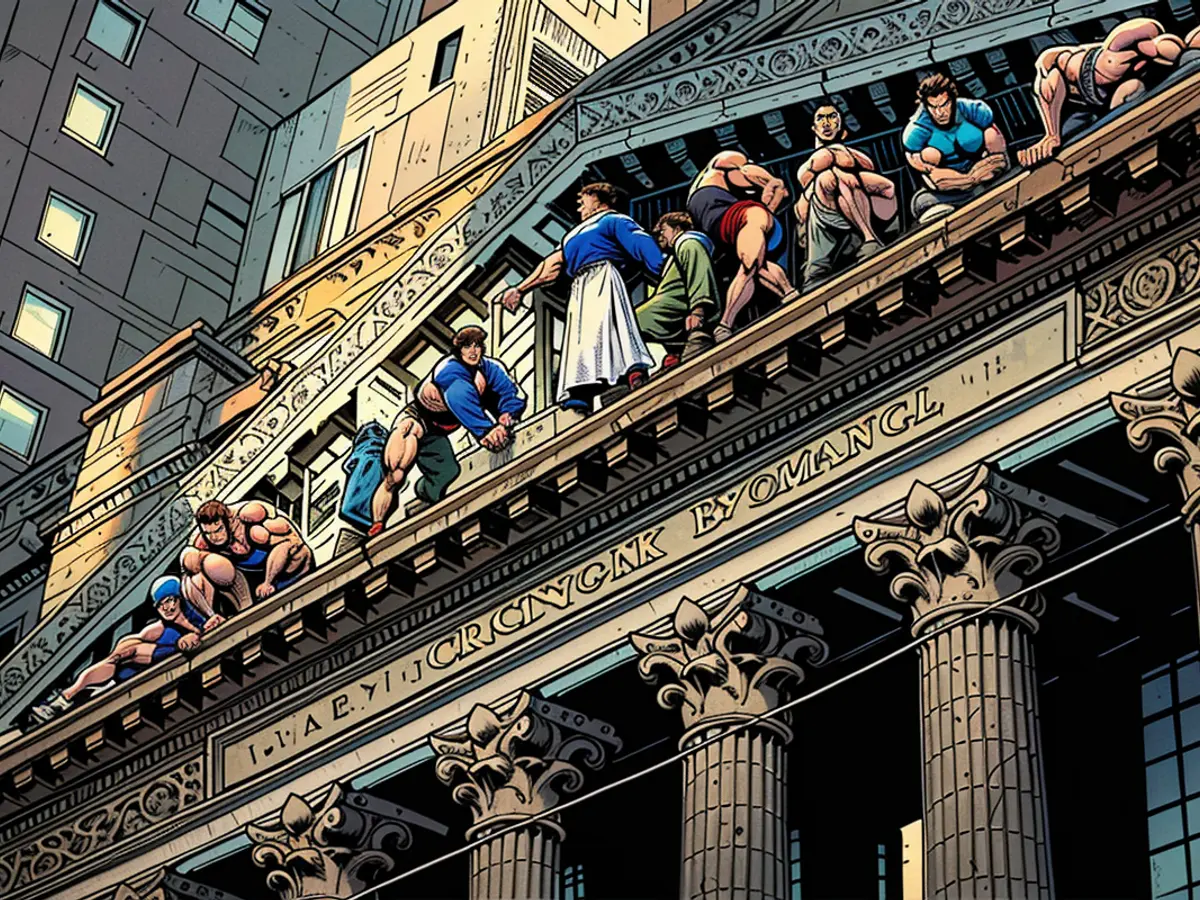The stock market panicked, but you shouldn’t
Not really, in this case.
To be sure, the carnage on Wall Street and in equities markets around the world was real. Stocks sank 3%, and the Dow tumbled more than 1,000 points for just the 15th time in the index’s 128-year history.
But Monday’s panic was the Wall Street equivalent of a tantrum from a kid who just got told they can’t have ice cream for dinner.
There are several reasons why the outburst was so dramatic, including the fact that trading volume is thin this time of year, when Wall Streeters tend to flee the trading desk for their semiannual migration to the Hamptons. But don’t let the stock market drama fool you: The US economy is still in good shape, despite some turbulence.
“The sky is not falling yet,” CNN analyst Rana Foroohar said Monday. “And I’m not too worried about Wall Street becoming poor.”
Stocks looked to bounce back Tuesday. It started in Japan, where the Nikkei 225 rebounded 10% after crashing 12% Monday. And US stock futures were broadly – if tepidly – higher Tuesday.
Reason 1: The jobs report
The US unemployment rate for the month of July was expected to hold steady at 4.1% when Friday’s jobs report came out. Instead it went up to 4.3%. That’s not great, but it’s not the kind of bad news that would normally trigger a huge selloff. Most of that increase was due to people rejoining the workforce, rather than people getting laid off.
And, as Goldman Sachs analysts noted, it’s just one month.
“We are hesitant to take the July jobs numbers as a new trend,” Goldman’s chief economist Jan Hatzius wrote in a note to clients. “It is usually a mistake to infer too much from one jobs report absent a major shock that abruptly changes the picture.”
And just to illuminate a bit about the unemployment rate: It goes up when people re-enter the job market, and it goes up when businesses impose temporary layoffs. Both things happened last month.
More than 70% of the increase in July came from temporary layoffs, which “might reverse and are not a good recession predictor,” Goldman analysts note.
There’s also debate about whether the market misread the Bureau of Labor Statistics’ statement suggesting that Hurricane Beryl, which hit the US Gulf Coast in late June and early July, “had no discernible effect on the national employment and unemployment data for July.”
BLS is saying Beryl didn’t affect its ability to collect data — not that Beryl didn’t affect the unemployment rate’s value, according to Aaron Sojourner, a labor economist at the WE Upjohn Institute for Employment Research.
The BLS reports estimates, it doesn’t interpret them, he added.
“A great summary of BLS comes from this old aphorism: ‘When asked if the glass is half full or half empty, BLS replies that there’s 4 ounces of liquid in an 8 ounce glass,’” wrote Sojourner, a former member of the White House Council of Economic Advisers.
Bottom line: One month is not a trend, and when you zoom out, there are still signs that labor market is cooling off. But demand remains strong.
Reason 2: Boo-hoo-ing over the Fed
Wall Street is tired of high interest rates, and traders have concluded that the bureaucrats over at the Federal Reserve should have cut rates at its policy meeting last week rather than holding steady.
They may even have a point here, but the Fed’s work is as much art as it is science. The economy is huge and unwieldy and the central bank has only blunt instruments to try to cajole it into a healthy equilibrium.
In some ways, Monday’s tantrum was a bit of Wall Street telling the Fed, “look what you made me do.”
Reason 3: AI isn’t the game-changer everyone hoped for
Markets were already in a foul mood last week because of broadly disappointing earnings from Big Tech, especially the heavily weighted artificial intelligence darlings like Nvidia and Microsoft.
Wall Street worked itself into a lather when ChatGPT came out two years ago. And ever since then, investors have been lavishing companies with cash in the hopes that AI is as revolutionary as its evangelists claim it will be. But Wall Street isn’t exactly known for its patience, and AI hasn’t done much of anything yet besides enhance web searches. (The Spotify DJ feature is pretty cool too, I guess?)
At some point, AI needs to make money for these companies rather than just cost money. Also not helping tech’s bull case: Google’s stunning defeat in its US antitrust case Monday.
Reason 4: The Bank of Japan took away the free money
In recent years, a popular money-making play for an investment firm would be to borrow cash in Japan, where interest rates have been firmly at zero for years, and use it to buy US Treasuries or tech stocks that have a higher yield. (It’s a strategy known as a “carry trade” — and you’re likely going to be hearing that term a lot this week.)
Problem is, the yen’s value has gone up in recent weeks, eroding the potential profit on the carry trade.
And last week, when the Bank of Japan hiked interest rates for the first time in nearly two decades, it prompted investors to unwind those positions. That means selling stocks to cover what you’ve borrowed.
And that is partly why Japanese stocks fell 12% Monday, their biggest daily loss in nearly four decades.
The unwinding of the yen carry trade acted as an accelerant to the US selloff that began last week, said Rob Haworth, director of investment strategy for US Bank.
“We really need to get through the assessment phase of this correction,” Haworth said. “At some point this week, hopefully, we can finally get to fundamentals.”
He added: “And the fundamentals look good.”
The business sector was closely watching the outcomes of the Federal Reserve's policy meeting, as Wall Street had expected interest rate cuts to stimulate economic growth. Additionally, several tech companies, including Google, faced legal challenges, which negatively impacted their stock prices and, in turn, affected the larger tech sector's business performance.







